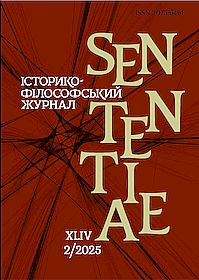Медицина й «істинна філософія» в Декарта
DOI:
https://doi.org/10.31649/sent44.02.131Ключові слова:
фізика, анатомія, фізіологія, метафізика, «Дискурсія про метод», «Принципи філософії», «Пасії душі»Анотація
У статті доведено, що терміном «Декартова медицина» доречно позначати «корисну науку», яка ще мала бути створена. Протягом життя Декарт так і не приступив до її створення. Тому будь-які його твори (як опубліковані, так і чернеткові) доречно називати «медичними текстами» лише в непрямому сенсі. У статті я полемізую з тезою Фабріціо Бальдассаррі, який називає такими текстами трактати L’Homme і La Description du corps humain. Сучасні праці з Декартових «медицини» чи «медичної філософії» (інтерпретованих як самостійні галузі Декартових досліджень) я піддаю критиці через їхню методологічну необґрунтованість. Спираючись на Декартові класифікацію наук і порядок реалізації дослідницької програми 1647 року я доводжу, що немає підстав говорити про власне «медичні» розвідки Декарта. Дослідження з анатомії і фізіології є законною частиною «фізики», а не «медицини» Декарта, хоч і дотичні до останньої. Також я виділяю три значення терміна «медицина» в текстах Декарта, доводячи, що жоден з них не дає підстав вважати трактати L’Homme і La Description du corps humain «медичними текстами» в Декартовому розумінні.
Посилання
Aucante, V. (2006). La philosophie médicale de Descartes. Paris: PUF. https://doi.org/10.3917/puf.aucan.2006.01
Baldassarri, F. (Ed.). (2023). Descartes and Medicine: Problems, Responses and Survival of a Cartesian Discipline. Turnhout: Brepols. https://doi.org/10.1484/M.DESCARTES-EB.5.123382
Baldassarri, F. (Ed.). (2023a). Lights & Shadows in Descartes’s Medicine. In F. Baldassarri (Ed.), Descartes and Medicine: Problems, Responses and Survival of a Cartesian Disci-pline (pp. 21-39). Turnhout: Brepols. https://doi.org/10.1484/M.DESCARTES-EB.5.132882
Carter, R. B. (1983). Descartes’ Medical Philosophy: The Organic Solution to the Mind-Body Problem. Baltimore: The Johns Hopkins UP.
Descartes, R. (1981). L’entretien avec Burman. (J.-M. Beyssade, Éd.). Paris: PUF.
Descartes, R. (1996). Œuvres complètes in 11 vol. (Сh. Adam & P. Tannery, Éds). Paris: Vrin.
Khoma, O. (2024). The Classic as a Modern Interlocutor: The Limits of Modernization. Svensson, F. (2024). Descartes’s Moral Perfectionism. New York: Routledge. [In Ukrainian]. Sententiae, 43(3), 170-177. https://doi.org/10.31649/sent43.03.170
Marion, J.-L. (2006). Préface: La médicine, a-t-elle un statut métaphysique? In V. Aucante, La philosophie médicale de Descartes (pp. xvii-xxi). Paris: PUF. https://shs.cairn.info/la-philosophie-medicale-de-descartes--9782130551164-page-XVII?lang=fr
Marion, J.-L. (2007). Descartes: état de la question. In J.-L. Marion (Éd.), Descartes (pp. 7-22). Paris: Bayard.
Marion, J.-L. (2013). Sur la pensée passive de Descartes. Paris: PUF. https://doi.org/10.3917/puf.mario.2013.01
Marion, J.-L. (2021). On the metaphysical prism of Descartes. In O. Khoma (Ed.), Descartes' “Meditations” in the mirror of modern interpretations (pp. 23-66). [In Ukrainian]. Kyiv: Duh i Litera.
Sextus Empiricus. (2020). Outlines of Pyrrhonism (I, 1-13). [In Ukrainian]. Sententiae, 39(2), 125-137. https://doi.org/10.31649/sent39.02.125
Shapin, S. (2000). Descartes the doctor: rationalism and its therapies. BJHS, 33, 131-154. https://doi.org/10.1017/S000708749900391X
##submission.downloads##
-
PDF
Завантажень PDF: 220
Опубліковано
Як цитувати
Номер
Розділ
Ліцензія

Ця робота ліцензується відповідно до Creative Commons Attribution 4.0 International License.
Автори, які публікуються у цьому журналі, згодні з такими умовами:
- Автори зберігають авторське право і надають журналу право першої публікації.
- Автори можуть укладати окремі, додаткові договірні угоди з неексклюзивного поширення опублікованої журналом версії статті (наприклад, розмістити її в інститутському репозиторії або опублікувати її в книзі), з визнанням її первісної публікації в цьому журналі.
- Авторам дозволяється і рекомендується розміщувати їхню роботу в Інтернеті (наприклад, в інституційних сховищах або на їхньому сайті) до і під час процесу подання, бо це може привести до продуктивних обмінів, а також скорішого і ширшого цитування опублікованих робіт.









.jpg)
.png)



